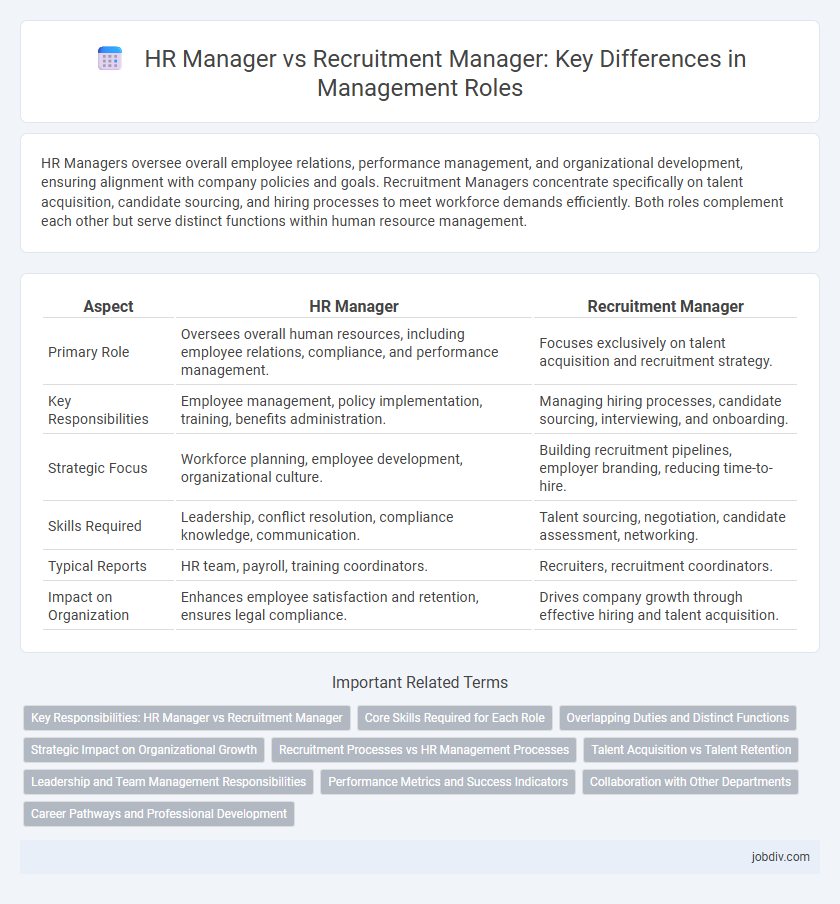HR Managers oversee overall employee relations, performance management, and organizational development, ensuring alignment with company policies and goals. Recruitment Managers concentrate specifically on talent acquisition, candidate sourcing, and hiring processes to meet workforce demands efficiently. Both roles complement each other but serve distinct functions within human resource management.
Table of Comparison
| Aspect | HR Manager | Recruitment Manager |
|---|---|---|
| Primary Role | Oversees overall human resources, including employee relations, compliance, and performance management. | Focuses exclusively on talent acquisition and recruitment strategy. |
| Key Responsibilities | Employee management, policy implementation, training, benefits administration. | Managing hiring processes, candidate sourcing, interviewing, and onboarding. |
| Strategic Focus | Workforce planning, employee development, organizational culture. | Building recruitment pipelines, employer branding, reducing time-to-hire. |
| Skills Required | Leadership, conflict resolution, compliance knowledge, communication. | Talent sourcing, negotiation, candidate assessment, networking. |
| Typical Reports | HR team, payroll, training coordinators. | Recruiters, recruitment coordinators. |
| Impact on Organization | Enhances employee satisfaction and retention, ensures legal compliance. | Drives company growth through effective hiring and talent acquisition. |
Key Responsibilities: HR Manager vs Recruitment Manager
HR Managers oversee comprehensive workforce planning, employee relations, performance management, and compliance with labor laws, ensuring alignment with organizational goals. Recruitment Managers specialize in talent acquisition strategies, candidate sourcing, interviewing, and onboarding processes to fulfill specific staffing needs. Both roles collaborate to optimize human capital but differ in scope, with HR Managers focusing on overall employee lifecycle management and Recruitment Managers concentrating on attracting and selecting qualified candidates.
Core Skills Required for Each Role
HR Managers require expertise in employee relations, performance management, and organizational development to foster a productive workplace culture. Recruitment Managers specialize in talent acquisition, candidate sourcing, and employer branding to attract and secure top talent efficiently. Both roles demand strong communication, strategic thinking, and interpersonal skills, but HR Managers emphasize long-term workforce planning while Recruitment Managers focus on hiring processes and candidate experience.
Overlapping Duties and Distinct Functions
HR Managers oversee overall employee relations, benefits administration, and compliance with labor laws, while Recruitment Managers focus specifically on talent acquisition, including sourcing, interviewing, and onboarding candidates. Both roles collaborate on workforce planning and maintaining organizational culture, ensuring alignment between hiring processes and broader HR policies. Distinct functions arise as HR Managers handle employee development and conflict resolution, whereas Recruitment Managers specialize in creating recruitment strategies and managing candidate pipelines.
Strategic Impact on Organizational Growth
HR Managers drive organizational growth by developing comprehensive talent management strategies, enhancing employee engagement, and fostering leadership development. Recruitment Managers contribute by identifying and attracting high-quality candidates aligned with business objectives, ensuring a steady pipeline of skilled talent. Their combined strategic impact optimizes workforce capabilities, supports long-term business goals, and strengthens competitive advantage.
Recruitment Processes vs HR Management Processes
Recruitment Managers specialize in recruitment processes, including sourcing, interviewing, and selecting candidates to fill job vacancies efficiently. HR Managers oversee broader HR management processes, such as employee relations, performance management, training, compliance, and benefits administration. The recruitment function is a subset of HR management, with Recruitment Managers focusing on talent acquisition while HR Managers handle ongoing employee management and organizational development.
Talent Acquisition vs Talent Retention
An HR Manager oversees comprehensive talent retention strategies including employee development, engagement, and performance management to maintain workforce stability and reduce turnover. In contrast, a Recruitment Manager specializes in talent acquisition, focusing on sourcing, attracting, and onboarding top candidates to fulfill organizational staffing needs. Effective collaboration between both roles ensures a balanced approach to acquiring new talent while retaining and nurturing existing employees for long-term organizational success.
Leadership and Team Management Responsibilities
HR Managers oversee overall leadership by developing strategic goals and fostering employee engagement across departments, ensuring alignment with organizational objectives. Recruitment Managers concentrate leadership efforts on managing talent acquisition teams, streamlining hiring processes, and driving workforce planning to meet staffing demands. Both roles require strong team management skills, but HR Managers focus on broader human resources functions while Recruitment Managers specialize in recruitment operations.
Performance Metrics and Success Indicators
HR Managers are evaluated using performance metrics such as employee retention rates, engagement scores, and overall organizational development impact, reflecting their broader role in workforce management. Recruitment Managers focus on success indicators including time-to-fill positions, quality of hire, and cost-per-hire, directly measuring the effectiveness of talent acquisition strategies. Both roles contribute to organizational success but emphasize distinct performance metrics aligned with their specific responsibilities.
Collaboration with Other Departments
HR Managers collaborate extensively with finance, operations, and legal departments to align workforce strategies with organizational goals and compliance standards. Recruitment Managers work closely with hiring managers and department heads to identify talent needs and streamline candidate selection processes. Both roles require seamless interdepartmental communication to optimize employee acquisition, retention, and overall human resource management.
Career Pathways and Professional Development
HR Managers typically oversee comprehensive personnel functions, including employee relations, compliance, and organizational development, positioning them for senior leadership roles such as HR Director or Chief Human Resources Officer. Recruitment Managers specialize in talent acquisition, developing expertise in sourcing strategies, employer branding, and candidate experience, which can lead to advancement in talent acquisition leadership or specialized recruitment consultancy roles. Both career pathways demand continuous professional development through certifications like SHRM-CP for HR Managers and AIRS for Recruitment Managers to enhance strategic impact and industry knowledge.
HR Manager vs Recruitment Manager Infographic

 jobdiv.com
jobdiv.com